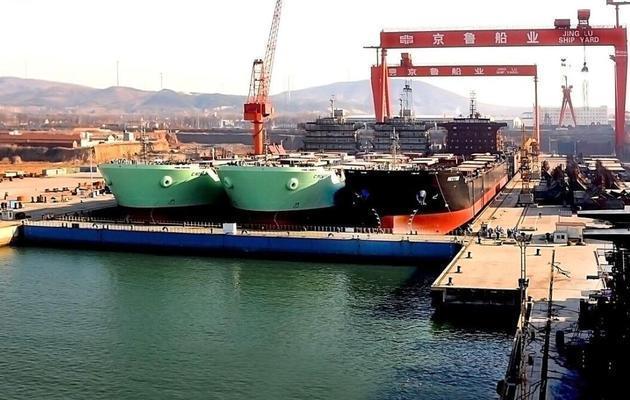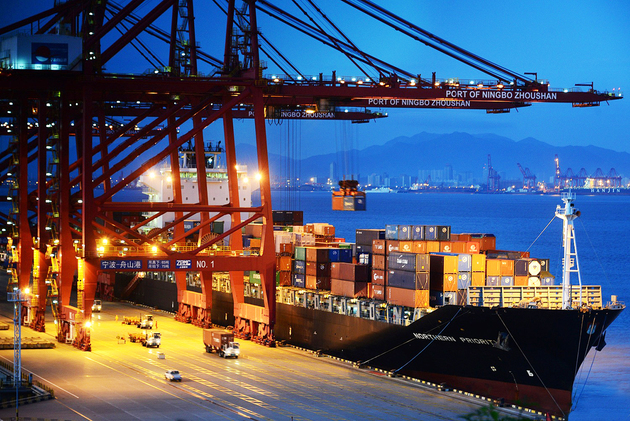Nov. 17 (NBD) -- The number of dedicated shipbuilding companies in the city of Penglai, North China's Shandong province has narrowed from three to only one, Guo Shuyuan, deputy general manager of Penglai Zhongbai Jinglu Ship Industry Co., Ltd. (hereinafter referred to as "Jinglu Shipyard"), said to NBD in an interview.
To private shipbuilders, capital is their biggest hurdle, according to several industry insiders in Shandong.

Photo provided by Jinglu Shipyard to NBD
Capital hinders private shipyards' growth
Since the shipbuilding industry was labeled as an industry with excessive production capacity, China's four state-owned banks have ceased their financing support to private shipbuilding companies, Guo explained. These shipyards cannot even get liquidity loans, let alone fixed asset loans.
The Chinese shipbuilding industry experienced significant slowdown after the 2008 financial crisis, just like plunging from the Himalayas into the Bohai Bay within half a month, he said. Many ship owners abandoned their ships after that, therefore unfinished ships were laid waste.
This gave a really hard time to banks issuing advance payment guarantee to shipbuilders. Since then, banks have been more prudent when issuing such guarantee letters, he added.
Before the financial crisis, issuing the letter of indemnity was really a good deal, as shipbuilders were required to put the advance payment into their accounts at the issuing banks, which means a great deal of demand deposits to the banks, said a source with the Qingdao branch of Industrial and Commercial Bank of China. However, when the crisis occurred, banks suffered a big blow as they had to shoulder the associated liabilities and losses incurred when the arbitration between shipbuilders and ship buyers took effect.
Due to difficulties in financing, more shipbuilding companies are going out of business, Guo stated.
Some private shipbuilders are now partnering with state-run ones, as the latter has spare guarantees, a senior executive with a Zhejiang-based private shipbuilder said.
Industry reshuffle will continue
With the recovery of the shipping business, shipbuilders are able to secure more orders.

Photo/VCG
Data from the China Association of the National Shipbuilding Industry (CANSI) shows that Chinese shipyards fulfilled ship orders with a combined capacity of 35.15 million dead weight tons (DWT) in the first three quarters of this year, up 41 percent year on year, and received new ship orders totaling 20.13 million DWT, up 8.7 percent from the same period a year earlier.
Against the backdrop of an accelerating global economic recovery and rising Baltic Dry Index (a barometer of global bulk shipping business), the gap between supply and demand will continue to narrow, and the dry bulk shipping market will have a bright prospect, said Rahul Sharan, chief analyst of dry bulk research at independent maritime research consultancy Drewry.
Though Jinglu Shipyard secured orders for more than 30 new ships in the January-September period, Guo still takes a prudent attitude towards the shipbuilding market, saying that things get better than last year, but it is far from enough.
Statistics from Clarkson Research Studies Limited, a leading provider of data and market intelligence for the global shipping industry, share the same concern, as new ship orders in the first nine months of this year only accounted for 12.58 percent of the 2007 peak in terms of DWT.
The overcapacity issue remains in the Chinese shipbuilding industry, and at least 30 percent of capacity needs to be slashed.
Financial institutions are still cautious about the niche industry though some banks are slightly loosening their loan policies for private shipyards, a government official from Yantai told NBD.
Ren Yuanlin, executive chairman of top Chinese shipbuilder Yangzijiang Shipbuilding Group Ltd., said that the industry reshuffle is expected to last three to four years and only 20 percent of shipyards can survive eventually.
Email: lansuying@nbd.com.cn


 川公网安备 51019002001991号
川公网安备 51019002001991号





